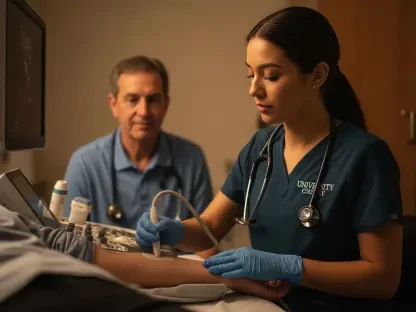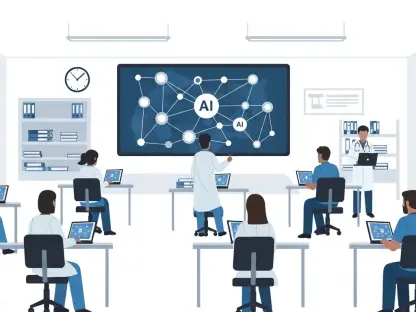In the heart of Dubai, a city renowned for its rapid advancement, emergency medical services face the critical challenge of keeping pace with a growing population and urban complexity, which now exceeds 3.5 million residents alongside millions of annual visitors. The demand for swift, reliable healthcare responses has never been higher, setting the stage for a groundbreaking collaboration between Moro Hub, a leading digital solutions provider, and the Dubai Corporation for Ambulance Services (DCAS), aiming to revolutionize emergency healthcare through cutting-edge technology. Their partnership, formalized recently, promises to redefine how life-saving services operate in one of the world’s most dynamic cities.
Overview of Dubai’s Healthcare Landscape and Digital Transformation
Dubai’s healthcare system stands as a pillar of public safety, particularly through its emergency medical services, which handle thousands of critical calls each year. These services are vital for ensuring timely interventions during accidents, medical crises, and natural disasters, directly impacting community well-being. The emirate has invested heavily in infrastructure and training to maintain high standards, yet the sheer volume of demand continues to push for innovative solutions to enhance responsiveness and efficiency.
Technology plays an increasingly central role in addressing these challenges, with digital transformation becoming a cornerstone of Dubai’s healthcare strategy. Key players like Moro Hub, a subsidiary of Digital DEWA, and DCAS are at the forefront, driving initiatives that integrate advanced tools into traditional systems. This aligns seamlessly with Dubai’s vision to become the world’s smartest city, leveraging data-driven approaches and smart infrastructure to improve quality of life across sectors, including healthcare.
The push toward digitalization is evident in policies and investments that prioritize connectivity and innovation. From telemedicine to real-time data analytics, technology is reshaping how care is delivered, especially in high-stakes emergency scenarios. This evolving landscape provides fertile ground for partnerships that can harness these advancements to achieve measurable improvements in public health outcomes.
The Strategic Partnership Between Moro Hub and DCAS
Core Objectives and Collaborative Focus Areas
At the core of the recent Memorandum of Understanding (MoU) signed between Moro Hub and DCAS during a major technology event in Dubai is a commitment to integrate digital solutions into emergency healthcare. This agreement, formalized by top executives from both entities, seeks to enhance the operational framework of ambulance services by embedding state-of-the-art systems. The primary aim is to ensure faster, more reliable responses to medical emergencies through a robust technological backbone.
Key areas of collaboration include cloud hosting and colocation services to manage vast amounts of critical data, alongside Internet of Things (IoT) applications for real-time tracking of resources. Additionally, artificial intelligence (AI) is set to play a pivotal role in predictive analytics for demand forecasting, while cybersecurity measures will safeguard sensitive patient information. Smart city solutions are also a focus, enabling seamless integration with urban infrastructure to optimize routing and response coordination.
This partnership is not merely about adopting technology but about creating a cohesive ecosystem where each component works in tandem to support emergency operations. By focusing on these innovative domains, the collaboration aims to set a new benchmark for how digital tools can enhance life-saving services in a metropolitan context, paving the way for scalable models of healthcare delivery.
Anticipated Impact and Benefits
The expected outcomes of this alliance are transformative, with significant improvements anticipated in emergency response times through real-time data sharing and AI-driven decision-making. Operational efficiency is another key benefit, as cloud-based systems streamline communication between dispatch centers and field units, reducing delays and resource waste. Enhanced service quality will likely follow, as technology enables better training simulations and patient care protocols.
Beyond immediate operational gains, this initiative aligns with Dubai’s broader digital and sustainability goals, emphasizing energy-efficient solutions and data-driven urban planning. Potential metrics for success could include a targeted reduction in average response times by a specific percentage over the next two years, from 2025 to 2027, alongside increased patient satisfaction scores. Such benchmarks will help gauge the tangible impact on community safety and trust in public services.
Moreover, the collaboration serves as a model for public-private synergy, demonstrating how specialized expertise from digital providers can complement the domain knowledge of healthcare entities. This strategic alignment not only addresses current needs but also positions Dubai as a leader in smart healthcare, with potential ripple effects across other sectors and regions.
Challenges in Modernizing Emergency Healthcare Services
Implementing digital solutions in emergency healthcare is not without hurdles, as technological integration often brings complexities in aligning new systems with legacy infrastructure. Compatibility issues between existing equipment and modern platforms can slow deployment, while training personnel to adapt to these tools requires time and investment. These technical challenges demand meticulous planning to ensure seamless transitions without disrupting critical services.
Data privacy remains a significant concern, given the sensitive nature of medical information handled by emergency services. Ensuring compliance with stringent regulations while maintaining accessibility for rapid response is a delicate balance. Additionally, resource allocation poses a challenge, as funding and expertise must be distributed effectively to prioritize high-impact areas without neglecting routine operations.
To address these obstacles, robust cybersecurity frameworks are essential to protect against breaches and build public confidence in digital systems. Collaborative efforts among stakeholders, including government bodies, technology providers, and healthcare professionals, will be crucial for troubleshooting integration issues and sharing best practices. Proactive strategies, such as phased rollouts and continuous feedback loops, can further mitigate risks and ensure sustainable progress.
Regulatory and Security Framework Supporting the Initiative
Dubai’s regulatory environment provides a strong foundation for digital transformation in healthcare, with policies that emphasize data protection and operational standards for emergency services. Guidelines set by authorities ensure that patient information is handled with the highest level of confidentiality, mandating encryption and secure storage practices. These regulations are designed to foster innovation while safeguarding public interests.
Compliance with such frameworks is non-negotiable for initiatives like the Moro Hub-DCAS partnership, as adherence builds trust among users and stakeholders. Security protocols, including regular audits and threat assessments, are integral to maintaining the integrity of digital platforms used in emergency response. These measures ensure that technological advancements do not compromise the reliability or safety of healthcare delivery.
Furthermore, alignment with international best practices in healthcare technology enhances the credibility of local efforts. By adhering to global standards, Dubai reinforces its commitment to excellence, ensuring that digital solutions are both effective and ethical. This regulatory backbone supports the partnership’s goals, creating an environment where innovation can thrive responsibly.
Future Outlook for Technology in Dubai’s Healthcare Sector
Looking ahead, the collaboration between Moro Hub and DCAS holds immense potential to reshape not only emergency services but also broader healthcare domains in Dubai. Scalability is a key consideration, with successful digital tools possibly expanding to areas like telemedicine, chronic disease management, and preventive care. Such expansion could create a more interconnected healthcare ecosystem, benefiting a wider population.
Emerging trends, such as advancements in AI for diagnostics and deeper integration with smart city infrastructure, are likely to influence the trajectory of these efforts. Real-time traffic data, for instance, could further optimize ambulance routes, while wearable devices might provide early warnings for medical emergencies. Learning from global best practices, Dubai can adapt proven strategies to its unique urban context, enhancing overall outcomes.
Over the next few years, from 2025 to 2027, continuous investment in research and development will be vital to keep pace with technological evolution. Partnerships like this one could serve as a blueprint for other cities, showcasing how targeted collaborations can address specific challenges while contributing to a larger vision of digital excellence. The long-term impact may well redefine healthcare accessibility and efficiency on a global scale.
Conclusion: A Vision for Smarter Healthcare in Dubai
Reflecting on the journey, the partnership between Moro Hub and DCAS marks a pivotal moment in Dubai’s pursuit of smarter healthcare solutions. Their combined efforts lay a foundation for integrating advanced technologies into emergency medical services, addressing critical needs with precision and innovation. The strides made in operational efficiency and response capabilities underscore the power of strategic alliances in public health.
Moving forward, a sustained focus on overcoming integration challenges and upholding security standards proves essential for long-term success. Stakeholders need to prioritize ongoing training and infrastructure upgrades to adapt to evolving technologies. By fostering a culture of collaboration and adaptability, Dubai positions itself to not only enhance emergency care but also inspire similar transformations worldwide.
As a next step, exploring pilot programs for scalable digital tools in other healthcare areas emerges as a practical consideration. Engaging with international experts to refine AI and IoT applications offers a pathway to maintain a competitive edge. This forward-thinking approach ensures that the legacy of this partnership continues to drive progress, cementing Dubai’s reputation as a beacon of innovation in healthcare delivery.









